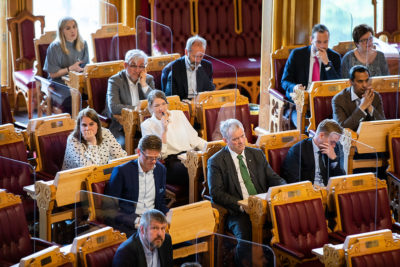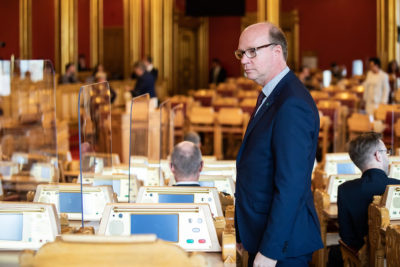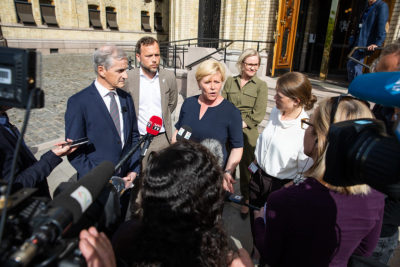UPDATED: A political “thriller” of historic dimensions led to sweeping reform on Tuesday of Norway’s biotechnology law. A majority of all 169 Members of Parliament voted to offer early testing in the first trimester of pregnancy and artificial insemination for single women at state expense, while also legalizing egg donations.

The unusual session had summoned all MPs to Parliament, to debate and vote individually on proposed but controversial changes to the biotech law. The sense of history in the making was further enhanced by the quick installation of Plexiglas between MPs’ seats, to address Corona virus infection concerns at a time when large gatherings otherwise are restricted.
At issue, however, were four controversial proposals for biotech law reform, all of which involved ethical and individual principles. MPs were thus allowed to vote in line with their own conscience instead of their party’s line.
It has been illegal, for example, for women to donate eggs to others who have difficulty conceiving themselves. Nor have single women been allowed to undergo artificial insemination at state expense, and the state has restricted early ultrasound and blood tests that can check for Downs Syndrome or other conditions related to the fetus.
Most parties on the left side of Norwegian politics have long advocated changing all that, as have the reform-minded Progress, Liberal and, in some areas, even the Conservative parties. The small Christian Democrats party (KrF), however, blocked all attempts at biotech law change in return for joining the Conservative government coalition last year and finally giving it a majority in Parliament.
When Progress later withdrew from the coalition in January, it no longer had to abide by the government’s biotech pact aimed solely at appeasing the Christian Democrats. It didn’t take long before the conservative Progress Party formed a new and highly unusual political alliance with Labour and the Socialist Left (SV) that recently proposed four changes to the biotech law that would legalize egg donation, provide for assisted insemination for singles and ultrasound earlier than in the 18th to 20th week of a pregnancy now allowed, and offer a blood test (NIPT) that also can detect even more than ultrasound.

That rang alarms among the Christian Democrats, who don’t want any biotech law changes that could prompt women to opt for abortion if informed well in advance that their child could be physically or mentally challenged. Despite all its egalitarian policies, women in Norway can still only freely opt for abortion within the first 12 weeks of pregnancy, a restriction secured by the Christian Democrats over the years, often with the help of the Center Party.
Labour, SV and Progress alone formed a slim majority to push through the biotech law changes they proposed, but then the Christian Democrats demanded the “full house” in Parliament with individual voting. They hoped that individuals, especially the most conservative members of the Progress Party, would join them in voting against the changes proposed by their own party. Arch-conservatives like Christian Tybring-Gjedde and Per-Willy Amundsen complied before Parliament even convened on Tuesday.
The plan backfired. Other MPs from other parties also announced plans to break with their party’s position and vote their own conscience, to the Christian Democrats’ disadvantage. Among them were Ketil Kjenseth of the Liberal Party, who confirmed on state broadcaster NRK’s morning politial talk show Politisk kvarter that he’d vote in favour of the liberalization and not in line with his party’s government pact with the Christian Democrats.
A few Conservative MPs also did the same and so did Progress’ Sylvi Listhaug. She had indicated she’d join the party’s renegades but told NRK that she ultimately voted with her party and the policy approved at Progress’ last annual meeting. She added that she supports putting new technology to use.

Such votes could thus offset those by the renegade Progress Party MPs. The Center Party, meanwhile, also allowed its MPs to vote individually but most were opposed the changes. MPs from Labour and SV were entirely in favour of the changes, and then the lone MPs from the Reds and Greens also joined in, although the Reds opposed allowing egg donation for commercial profit.
In the end, the vote ended at 89 in favour of liberalizing the biotech law and 80 against. Most political commentators had predicted approval of all four law changes, and it all amounted to a crushing defeat for the Christian Democrats, which remains firmly opposed to abortion and clearing the way for what it calls a sorterings samfunn, in which parents can opt against having children with physical or mental challenges.
The Christian Democrats are also currently sagging in public opinion polls with less than 3 percent of the vote. “The early ultrasound worries me the most,” a disappointed Geir Bekkevold of the Christian Democrats told NRK after the votes were tallied. “We are disappointed that the Progress Party turned on us, and that we have landed in the situation we have today.”
Heated debate
Both Progress and Labour politicians were forceful in Parliamentary debate on the proposed changes. Labour Party leader Jonas Gahr Støre, who served as both health- and foreign minister in the former left-center government, said he voted in line with his own conscience on Tuesday when he backed all four changes in the biotech law.
“It’s also a matter of conscience to make knowedge available for everyone,” Støre said in defending a pregnant woman’s right to early ultrasound and blood testing. “Our society shall have a place for everyone, and those living with suffering get help. We don’t achieve that by holding back information from pregnant women. There is no monopoly on conscience in these questions.”
The Progress Party’s Kari Kjønnås Kjos lashed out at what she called a “campaign from the Christian Democrats” regarding human values. Their claim, she said, is that “everyone who wants early information about their pregnancy is only hunting Downs and trying to sort it out. But the Christian Democrats don’t in fact know what all pregnant women are thinking, or want. The Christian Democrats are basically telling people with Downs that most people don’t want them. I deplore that, and it makes me very sad.”
MP Torill Selsvold Nyborg of the Christian Democrats lashed back from the podium in Parliament, claiming she totally rejected the description of her party that Kjos had given. “I just want to say that from the podium,” Nyborg said.
Others, including MP Åshild Bruun-Gundersen of the Progress Party, claimed it simply “was time we started using 2020 technology, not technology from 2004.”
NewsInEnglish.no/Nina Berglund

